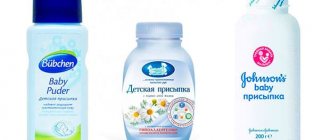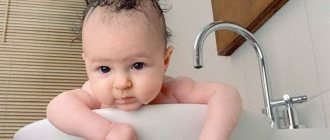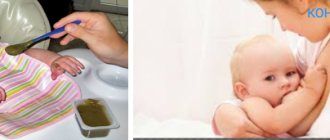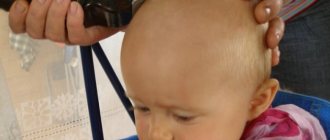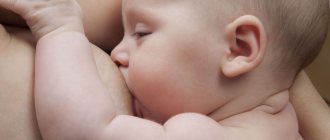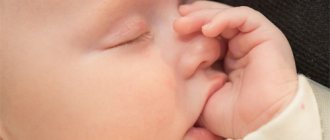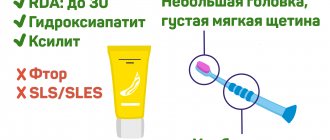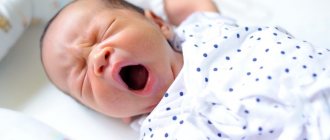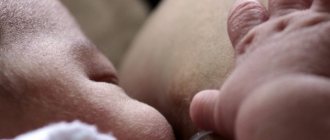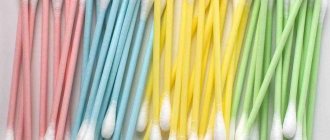Should you wash after every trip to the toilet? Wrong
Babies go to the toilet quite often, and as for minor needs, a good diaper copes with this task perfectly. If you change the diaper on time, the perineal area remains sufficiently dry and clean; there is no need to wash it.
But if an act of defecation has occurred, the child needs to be washed. In this case, it is possible to use special baby soap or detergent.
When babies are washed too often, beneficial microorganisms that help cope with the attack of harmful microbes are washed out from the mucous membrane and surface of the skin.
“If you wash your baby too often using special products, this can lead to disruption of the skin microbiome, inflammation and even infection. Therefore, sometimes it’s enough just to rinse the baby with water,” adds allergist-dermatologist Anna Bolshakova . Otherwise, we essentially destroy local immunity.
Caring for a boy after washing
After you have managed to wash your baby, you must treat the skin with cream. Previously, every mother always had powder on hand. It was applied to the skin and the child was dressed. Thanks to the zinc included in the composition, delicate skin was protected from prolonged exposure to urine. The need for powders was due to the lack of quality diapers on sale.
Today, the need to use bulk cosmetics has decreased significantly, but has not disappeared. With the advent of disposable diapers, some women no longer understand how many times a day their baby urinates. They see that it is time to change the linen only when it is already hanging to the ground from overfilling, and the child is chained to the crib like a weight. Not a single representative of disposable panties, even the highest quality, is capable of protecting a child’s skin from getting wet. Therefore, modern children develop diaper rash and dermatitis, which can be eliminated with the help of powder.
What to process
It is most reasonable to prevent the formation of irritations on the child’s skin. Therefore, pediatricians and dermatologists advise lubricating the area under the diaper with thick baby cream. It is better if it contains zinc; tubes with such creams usually have the “Zn” sign on them. The addition of a formula with this element in the cream provides reliable protection against getting wet. A dense layer of cream does not allow moisture to pass through to the skin, while simultaneously moisturizing it.
Every mother should think not only about how to wash her newborn, but also about what she will use to treat her delicate skin. After an evening bath, the child’s body must be treated with two different creams:
- containing zinc, for the area under the diaper;
- moisturizing, to treat the rest of the body.
Important! The choice of cream to apply to children's skin should not be based on the brightness of the packaging, loudness of the brand and price, but on its composition. You can buy an expensive cream with lavender extract from a famous manufacturer and get red allergic spots all over your body. You can buy an inexpensive white cream in an unattractive tube, without fragrances or other additives, which will perfectly moisturize the skin without causing unpredictable skin reactions.
Mom and healthy baby
Every mother should know how to properly wash a baby boy. Excessive care for the genital organ causes more problems than it brings benefits. Nature reliably protects delicate tissue from infections, so you should not try to penetrate into places where physiology does not provide for it.
Laundry soap - the head of everything? Wrong
Do not wash your child with laundry soap. This product has a far from neutral pH level, and therefore it can dry out the baby’s delicate skin. And overdried skin is defenseless against harmful organisms. For the same reason, you cannot use any “adult” products for baby hygiene. Such washings can only harm the child.
Algorithm for washing a newborn
When changing a diaper, give preference to cleansing the skin by washing. Wet wipes can be used, but only:
- if the skin is not contaminated with feces,
- when changing diapers at night,
- in the absence of the possibility of using water.
For washing you will need:
- diaper,
- towel,
- gel for washing babies (with dispenser),
- clean diaper,
- diaper cream
Procedure:
- Place your newborn on the changing table.
- Remove soiled clothing and dirty diaper.
- Bring the baby to the water and gently, slowly wash it.
- For heavy soiling, use baby wash gel for gentle cleansing. A package with a dispenser will be convenient for mom, and the dispenser will also prevent germs from getting inside the bottle.
- After washing, cover the baby with a towel or diaper. Place him on the changing table. Gently blot (do not rub!) the baby's skin with a towel and dry it.
- Let the baby lie without a diaper for 5 minutes. Let the skin in this area breathe.
- Before putting on a diaper, to nourish and protect delicate skin from the aggressive effects of excretory products, apply a thin layer of diaper cream. It is enough to apply the cream 2-3 times a day. Lubricate the inguinal folds, anus and buttocks.
- Put on a clean diaper and clothes.
The more thorough the better? Wrong
Under no circumstances should you pour soap or any product directly onto the mucous membrane. First you need to rub the product on your palms and then apply it to the skin of the perineum without excessive zeal. There is no need to try to “wash inside” in either girls or boys. You will get nothing but pain and subsequent inflammation.
Features of washing newborn boys
There are many myths about grooming boys. Young parents especially have a lot of questions around the baby’s foreskin. It is necessary to understand all these nuances, since intimate hygiene is the key to the reproductive health of a little person. Any urologist will tell you that many adult problems of men come from childhood: their parents simply did not properly carry out their intimate hygiene.
Soap
First, let's look at the best way to wash your baby. If you use soap, it should have an alkaline balance of pH 5.5 - close to the skin balance, be colorless and odorless. Antibacterial additives are best avoided, as they destroy natural protective barriers, which in turn can lead to impaired immunity, inflammatory reactions, and diaper dermatitis.
It is worth especially noting the fact that frequent use of soap is not welcomed by many pediatricians. If it is not thoroughly washed between the foreskin and the glans (and with frequent use this is quite likely), then quite serious chemical burns can occur.
Pediatricians do not recommend washing newborns with soap (even baby soap) in the first months of their life. If soap is not rinsed well, it can cause inflammation on the mucous membranes.
By the way, the question of whether to use detergents when washing or not is closely related to the question of the regularity and frequency of washing in general.
How often should I wash?
It may not come as a shock to new mothers, but frequent washing (even without soap) can lead to serious problems. The male organ is capable of providing insulation for itself: the foreskin covers the head, protecting it, and a special secretion is produced between them - smegma, which has bactericidal properties and “kills” all bacteria.
In addition, the skin of the penis in boys is not yet as elastic as in adult men. The elasticity of the skin depends on the level of sex hormones in the blood, and newborns do not yet have them. That is, the foreskin is motionless during this period of the boy’s life, which means it is impossible to see the head. Essentially, everything is isolated there, and nothing harmful comes from outside. During this period, you can wash the baby with soap, but not often, and without trying to push back the foreskin.
In a slightly later period of infancy, when the foreskin begins to move back and becomes more mobile, you need to be more careful with soap. Often, inexperienced parents, when washing the boy, push back the foreskin in order to “rinse everything there well.” The soap gets there and inflammation begins. Therefore, the recommendations of official medicine sound like this: boys’ hygiene should include only EXTERNAL washing.
It is optimal to wash your baby once a day before bed and after each bowel movement. Frequent washing (for example, after each urination), especially with soap, can negatively affect both the condition of the skin and the health of the reproductive organs of children of both sexes
In addition, children's feces do not have the same odor as those of an adult, and they are easily washed off with water. Plain water does not wash away meconium. On the first day, while the meconium is passing, you can use baby soap or gel to wash babies.
Tip: To help meconium leave the skin better, when swaddling a newborn, apply a rich cream to the area under the diaper.
Foreskin
Leucorrhoea (smegma), which is secreted in boys, if it is not abundant, is not accompanied by redness and swelling, it does not bother the baby and does not indicate a health problem. This is a natural discharge and there is no need to pick them out. It is better to rinse the penis in plain water without directing the stream at it.
There is no need to retract the foreskin either. Children have this anatomical feature: the hood of the foreskin sticks to the head of the penis. And if you forcefully move it away, you can seriously injure the child. Consequences ─ open wound, pain, risk of infection. Complete separation of the foreskin and head of the penis occurs by age 10, but in some boys it may occur earlier.
What should you be wary of?
- redness,
- tumor,
- edema,
- Inflating the foreskin when urinating.
Important: a small bubble can inflate in healthy children, but this phenomenon is not constant, but periodic. If EVERY urination is accompanied by inflating, it is difficult, then you should visit a doctor.
How to wash?
For boys, the direction of washing is not important, unlike girls, who must be washed from front to back.
It is recommended to wash babies after each bowel movement. If the baby just peed, then it is acceptable to use wet wipes for newborns, but it is correct not to use anything.
Before you wet your baby, be sure to open the tap and let the water drain. Make sure the water is at an optimally pleasant temperature.
It is more convenient to hold the baby on your non-dominant hand: if you are right-handed, then this will be your left hand, and if you are left-handed, then your right. The head is at your elbow, the butt is in the palm of your hand.
How to properly wash a child?
We talked about what not to do so as not to harm the baby. Now we’ll find out how to wash children correctly and rationally.
You need to wash your baby after every bowel movement.
Using a special children's product - 1-2 times a day is enough. The rest of the time, you can just use running water. Please note: this should be running water at an optimal temperature (approximately body temperature). Putting a child in a bathtub and washing it right there is wrong. If it is not possible to open a water tap, “make” running water using a bucket of water and a ladle. And do not put the child in the water with which he was just washed.
Choose the right intimate hygiene products for babies
It is best if these are special gels or foams for babies, and not just baby soap. Such products usually have soft compositions and maximum neutral acidity; they do not cause irritation to delicate baby skin. “Children's washes should not contain any additional acids that are usually added to adult washes. The fact is that the baby’s mucous membranes simply don’t need them,” says allergist-dermatologist Anna Bolshakova.
Baby washing gel from the manufacturer AQA baby not only does not dry out the skin, but even helps to restore the important hydrolipid barrier of the skin that protects it. The gel contains such important ingredients for skin restoration as allantoin and panthenol. It also contains peach oil, calendula and chamomile extracts. These components relieve inflammation and soften the skin.
In addition, AQA baby offers separate hygiene products for boys and girls.
The gel for washing boys is so gentle on the baby’s delicate skin that it is recommended even after the circumcision procedure. The skin of boys' perineum needs special care so that they do not have problems with the genitourinary system in the future. The gel contains allantoin and bisabolol, which strengthen the skin's natural defenses and also relieve inflammation and redness while maintaining the correct pH level.
It is important to remember that you cannot deliberately push back the foreskin when washing boys and rinse the inside of the penis.
For girls, the same line includes two washing products: gel and foam.
The foam has a more airy consistency and does not require additional foaming. Otherwise, the properties and characteristics of these two products are identical.
Both the gel and the foam were developed together with gynecologists and created specifically for girls from birth to 9 years. It is during this period that the microflora of the intimate zone in girls is especially sensitive.
It has been proven that it differs from the microflora of adult women in that it is slightly acidic, and therefore less protected. Therefore, the gel and foam include the prebiotic inulin, which controls the level of important lactobacilli.
In addition, both products maintain the natural pH level in the intimate area of girls. The gel and foam also contain calendula and chamomile, which soothe the skin and relieve inflammation. The product is declared as a prophylactic to prevent vaginitis, vulvitis and synechiae.
How many times a day should you wash your newborn?
How to hold a newborn while washing
How often a newborn’s bottom needs to be washed under the tap depends on how many times a day a child soils a diaper. Children are not washed after each urination, especially if high-quality diapers are used. After defecation, you need to wash. Despite the fact that modern diapers are capable of absorbing children's liquid stool, it is unacceptable to use even the most expensive diaper after the child has soiled it with feces. The diaper should be changed to a clean one, and the baby's skin should be washed.
Regardless of whether the baby soiled his diaper before bed or not, the baby should be cleaned before bed unless bathing is planned. If baby urine comes into contact with the skin for a long time, it can cause rashes, diaper rash, or other forms of dermatitis.
Features of washing newborn girls
There are also many nuances in this issue that young parents should be aware of. You need to realize the full responsibility of proper, adequate care for the intimate parts of a girl’s body, because your task is to preserve her reproductive health. Don't forget, newborn girls are future mothers!
Girls, unlike boys, need to be washed in only one direction - from the labia to the butt. This is a very important nuance, since particles of feces can get into the vagina if you wash it incorrectly.
How often to wash and with what?
We recommend reading: How to bathe a newborn boy
Just like boys, girls do not need to be washed 20 times a day, especially with soap, which often causes more problems than it brings benefits. If you wash your baby with soap or gel for washing babies, then this is no more than once a day. Newborns should be washed after each bowel movement, and after a pee, it is enough to wipe the area under the diaper with a damp cloth or do nothing at all (most modern diapers allow the bottoms to remain dry). You can also wash your baby once before bed.
Soap for girls has very strict requirements: no fragrances, dyes, required pH. Therefore, if you still decide to use this product, then buy liquid soap for children in their first year of life. Products produced for children in the first year of life go through more stages of licensing and control than any other.
Once again, I would like to emphasize that in the first months of a newborn’s life, the use of any cosmetic products is undesirable or should be done with great caution. They often dry out the skin and kill the bacterial flora that should be in the intimate places of girls.
Special instructions regarding intimate hygiene products: they have a clear age category (must be taken for girls, not for adult women!).
Girls labia
Is it necessary to open the girl’s large labia and wash everything inside? There are two extremes: some parents open the labia every day and thoroughly wash everything there, while others, on the contrary, do not open or touch anything there. Both of these are fundamentally wrong.
2-3 times a week you need to spread the labia of the newborn. Between the labia majora and minora, babies have a lubricant (smegma) - a secretion that serves to form flora and also to prevent friction between the lips. If you constantly remove smegma, friction will certainly arise, cracks will begin to appear and, as a result, inflammation.
But in addition to smegma, feces accumulate between the sponges, remnants of cosmetics that mothers use for diapers, powders, etc. The excess must be carefully removed with a cotton ball soaked in sterile vegetable oil.
How to wash
- Wash the girl only with your hand, do not use any improvised means (sponge, washcloth, etc.).
- The water should be running, body temperature (34─37°C).
- The girl is held under the tap with her tummy up. In this case, you can hold one leg with your right hand, bending it slightly, and wash the perineum with your other hand.
- Hand movements should only be from front to back - from the vagina to the butt. This way you will avoid getting stool into your vagina.
- After you have washed your baby, you need to carefully dry her with a towel. The towel should be a child's towel, softer for the skin. You should first wipe the labia, then the folds in the groin area, and only then the anus.
https://youtu.be/HmLE8yfySfs
As you can see, there is nothing complicated in caring for the diaper area and intimate hygiene - the rules are extremely simple. The only thing you need to adhere to is moderation, the golden mean. Any extremes - both frequent and infrequent washings - can lead to dire consequences. Pay attention to the individual characteristics of your child’s body, remove dirt when it really needs to be removed, systematize care and hygiene (for example, bathing once every 3 days, washing only after bowel movements and once at night), and everything will be fine.
